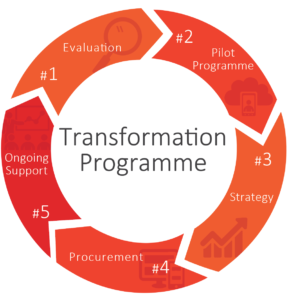Thought Piece: An Holistic Strategy Is Key to Teaching & Learning Transformation – restating the case for Training

Research and common sense demonstrates that what happens in the classroom is the greatest contributor to successful learner experiences.
As such, for decades schools have been talking about, and developing ways of transforming Teaching & Learning using the new technologies available to them. However, in the past many have been failed as they have not been part of a holistic strategic approach. There are as many models used in developing such a strategy as there are definitions of the word transformation but in many instances they can become over complicated and driven by the features of the technology rather than led by Teaching & Learning. As such they don’t deliver or are unsustainable. As trusted educators from a range of backgrounds including School Heads, Year Group Leaders, Heads of Departments, Governors, Policy Makers and Academic Researchers, we believe that the simpler and more inclusive the Transformation process the easier it is to implement and, more importantly, to maintain.

Evaluation
Before beginning to develop any strategy, it is key to evaluate exactly where you are and where you want to be. This phase sounds simple but is not as it must involve take experiential input from ALL staff but also include the views of other stakeholders, including students and parents if possible. This all-inclusive stage of data gathering ensures that there is a feeling of cohesive ownership which can reduce numerous human barriers to implementation and maintenance down the line. Our approach is to use the data gathered in this phase to produce a RAG (Red Amber Green) ‘state of the nation’ overview as to where is school currently is on its current journey and any staff skills gaps or other barriers that could prevent a successful implementation.
Pilot Programme
By conducting a small pilot programme using the data gathered in Phase 1, potential technical solutions can be identified, and solution elements tested by staff. Hardware devices are tested by way of short term loan equipment and a CPD Training Plan and ongoing support is provided during this period. Staff on the pilot are then used as Digital Leaders to provide day to day on-site support to their colleagues.
Strategy
The Pilot Programme is constantly reviewed based on agreed objectives and outcomes from the evaluation process and by discussing a range of tested models from the UK, the USA and other countries, a Trust or School Wide Strategy is produced and agreed by key stakeholders. Many of the international models discussed in this phase such as SAMR will be well known in the UK. However, there are many others developed by very successful Countries and School Districts which will be new to UK staff. By considering a range of models to the school, the model best suited to meet the individual needs of the school can be identified and embedded into the Transformation/ Digital Strategy.
Procurement
Procurement may sound like the easiest phase in this process as we know what we want – right? However, it is sometime difficult to ensure impartiality and explore a range of SFV (special financial vehicles) including subscription, leasing and parental contribution. During this phase the school business manager needs support to provide the evaluation of responses to the tender.
Ongoing Support
This phase is one that many schools overlook when developing their strategy, which is strange given that the key resource in ensuring sustainability is both administration and teaching staff. Ongoing classroom exposure to new technologies will provide additional value to the Learning journey of students. For this reason, providing a range of ongoing support is key in ensuring sustainability and future proofing.
The best strategies for support for schools in this phase range from a mixture of on-site and blended staff training based on a clear CPD Plan, running of Student Enrichment days where we bring all the necessary technology, ongoing consultancy, independent advice and support related to the use of technology, access to an online training platform of short bite-sized review materials, and even. an option to employ a full time ‘Teacher’s Apprentice’, trained and supported by Tablet Academy as a hybrid between Teaching Assistant and Classroom Technician.
Summary
A definitive step in ensuring the successful implementation of any technology inclusive Transformation Strategy is ensuring that the school gets support to achieve objectivity during every phase of its development and implementation. By drawing on case studies not just from the UK but also from other successful schools world-wide. The key is ensuring that the Strategy is Holistic, Inclusive and is designed to meet the needs of Students to achieve the school’s vision.
